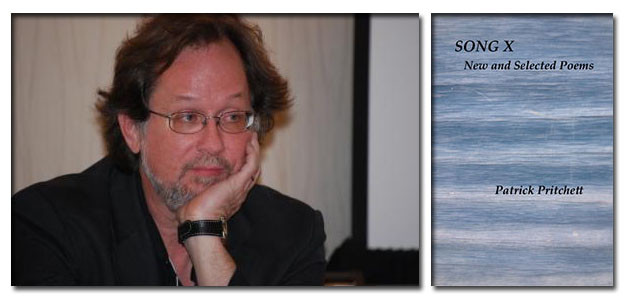‘the unspeakable, the unutterable’

Song X: New and Selected Poems
Song X: New and Selected Poems
Over the past two decades, poet and essayist Patrick Pritchett has been quietly building an impressive and altogether unique body of work, culminating in a recent (2014) new and selected poems, Song X, which is derived from previous collections Gnostic Frequencies (Spuyten Duyvil, 2011), Antiphonal (Pressed Wafer, 2008), Burn: Doxology for Joan of Arc (Chax Press, 2005), and Reside (Dead Metaphor Press, 1999). Song X takes its title from Pat Metheny and Ornette Coleman’s free jazz album, implying that the poetry included here is, like the work of those artists, an experiment in form — one that aims to transcend the limitations of language, namely the unsurpassable gulf between materiality and spirituality that has vexed writers possibly since language’s invention. As with his Romantic and transcendentalist forebears, Pritchett’s lyric modus operandi is to find a way past these intrinsic limitations of form and to fold them into his compositional practice; in other words, to make a potential source of weakness a poetic strength.
And there is much strength — of line, mind, and spirit — to be found in these poems, which at times approach a pure lyricism unmatched in English poetry since Swinburne. Yet Pritchett’s work often leans on a self-described “new Gnosticism,” which Pritchett has described as “a lost mode of visionary poetics by experimental means […] haunted by the ghosts of theology and making it their work to sift through its ruins, working within the parenthetical gap articulated so well by poet Robin Blaser: ‘we’re no longer inside of religion, but we are still inside of whatever happened to it.’”[1]
Burn, perhaps the most gnostic of Pritchett’s works, is a book-length “doxology” (classically a liturgical praise to God) of interconnected poems addressing — in a decidedly abstract, intuitive, and emotional sense — the martyrdom of Joan of Arc. The collection is arguably Pritchett’s most accomplished, containing his most pleasingly lyric and metaphorically rich work; Pritchett has an attraction toward, and a gift for composing, serial poetry. Here, Pritchett describes the martyrdom of Joan as “encrypting the body of dust in the body of flame.”
[2] What is most remarkable about this sequence is Pritchett’s ability, through tone and language, to evoke an immensely personal vision, whatever its dependency on the historical figure of Joan. In fact, Burn shares much commonality with mid-twentieth-century American confessional poetry, though stripped of its often psychological context; Pritchett prefers to distill his emotional resonances to an almost purely visionary experience — in other words, poetry as secular religion.
In an endnote to Gnostic Frequencies (not reprinted here), Pritchett notes that the “crux” of his poems lies in “the unspeakable, the unutterable — in the darkness that surrounds and informs the matter of the poem as logos itself is what emerges, not from spirit, but out of earth. Whatever escapes language even as it transfigures it.”[3] What this involves is an attempt at a poetic reintegration of the visionary and the everyday. In this, Pritchett evokes the paradoxical necessity of language to the human experience, how ingrained and essential it is to our psyche, whatever its liminality and material restrictiveness. “The secret of transparency is / the opacity of its halo” (108), Pritchett writes in the poem “Gnostic Frequencies.” In other words, the more truth one hopes to achieve in language — and that is Pritchett’s ultimate aim — the more difficult and imprecise the language becomes. Pritchett’s gift is his ability to achieve such remarkably precise yet transcendent lyrics amidst the strenuous imprecisions of words.
1. In personal correspondence with the reviewer dated March 15, 2016. (A longer statement is available on Pritchett’s always fascinating, if infrequently updated, blog, Writing the Messianic.)
2. Patrick Pritchett, Song X: New and Selected Poems (Northfield, MA: Talisman House, 2014), 17.
3. Patrick Pritchett, Gnostic Frequencies (Brooklyn, NY: Spuytin Duyvil Press, 2011), 159.